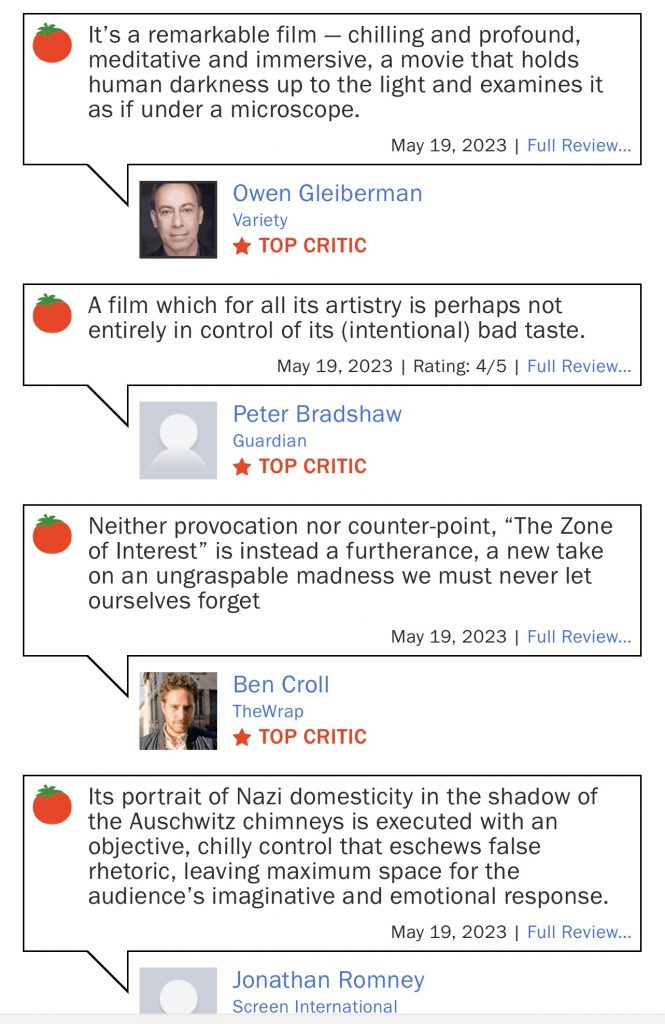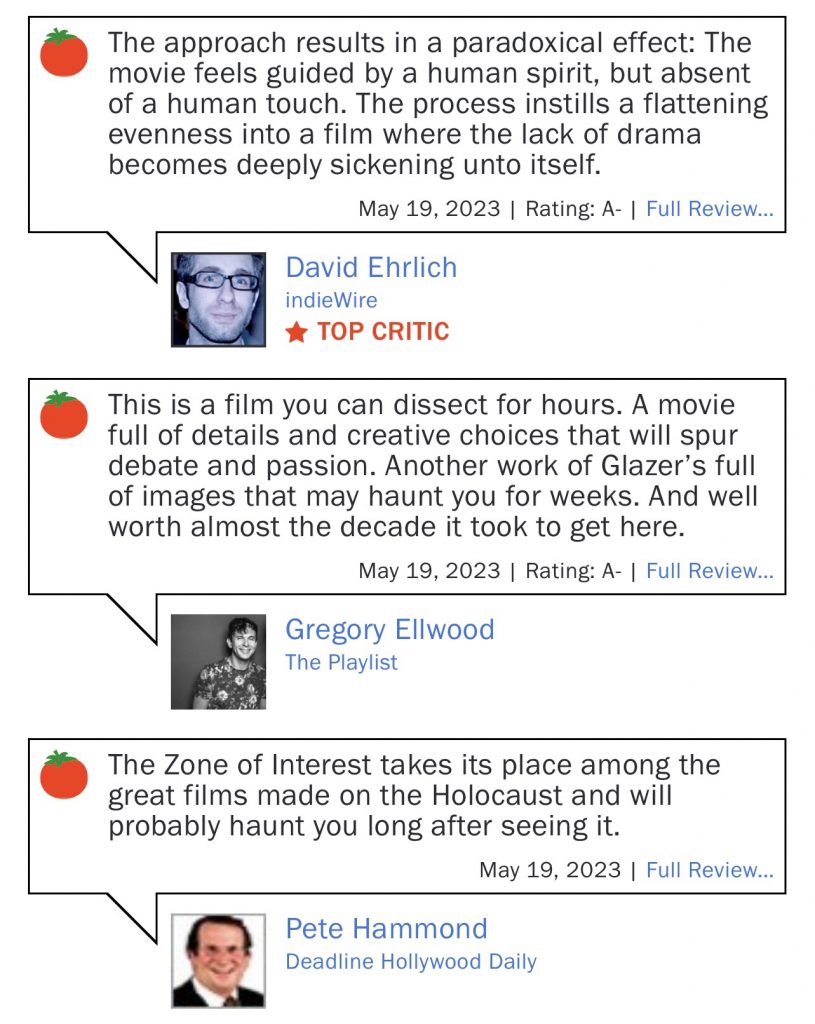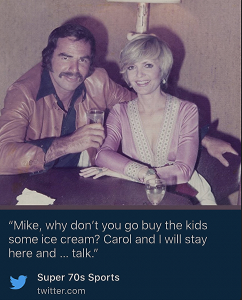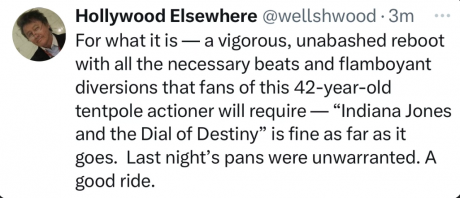The press screening happens Saturday afternoon at 4:30 pm (7:30 am in Los Angeles), and will break sometime around 8 pm, give or take.

The press screening happens Saturday afternoon at 4:30 pm (7:30 am in Los Angeles), and will break sometime around 8 pm, give or take.

Jonathan Glazer‘s The Zone of Interest is an ice-pick art film about evil with a capital E — a riveting, unmistakably horrifying portrait of the home life of Rudolf Höss (Christian Friedel), commandant of the infamous Auschwitz prison camp during World War II, and his wife Hedwig (Toni Erdmann‘s Sandra Hüller).
Rudolf, Hedwig and the kids reside in a large, handsome home just outside the gates of the camp, and mostly we’re just shown the day-to-day of meals, housekeeping, horseback riding, idle chatting with friends, casual infidelities and whatnot.
Glazer’s basic strategy is to allow subtle allusions, hints and insinuations of the Auschwitz horror to seep into this atmosphere of domesticity. Toward the end are two or three scenes of Rudolf meeting with military colleagues about a planned, ramped-up extermination of Hungarian Jews, but Glazer keeps it all curt and officious, saying to us “can you sense it…can you feel it?”
The vibe is ghastly and revolting, of course. The moral delivery feels like…I don’t know, gas filling your lungs or poison spreading through your veins. Little plop-plops of horror like Alka Seltzer tablets.
The film is basically one static tableau after another. The Hoss family taking a swim, the children playing on the grounds, Rudolf professing love for his favorite horse in the stable, Rudolf and Hedwig indulging themselves with lovers on the side, etc.
The Zone of Interest begins with a spooky overture (the composer is Mica Levi) against a black screen, and to be completely honest it was this overture that put the hook in more than anything else.
Because the movie that follows has no story — it is simply about exposing Rudolf and Hedwig’s aloofness and apartness — cruelty, denial, an absence of basic humanity. Here be monsters.
The second best sequence comes at the very end, a series of flash-forward, present-day images of what I presume is the Auschwitz-Birkenau State Museum, and then Glazer dovetailing back to 1942 as Rudolf is seemingly struck by a vision of what the future will bring, and (perhaps) who and what he is.
It all “works” but man, this film is dry as a bone. Like a frigid, long-buried fossil. Dry-ice steam filling the air.
The Cannes mob, of course, is praising it to the heavens because of the toxic moral current and Glazer’s arthouse strategy. Cannes critics can’t be iffy about such a film — they have to jump up and down lest they seem indifferent or unmoved by what Zone is presenting and how it all sinks in.
It’s a film that certainly sticks to your ribs (I can feel it kicking around inside as I write this), but I have to say that I found it too spare, too artified and rigidly schematic to a fault.
As I watched I was asking myself what is this movie saying that wasn’t in Steven Spielberg‘s Schindler’s List or Loring Mandel‘s Conspiracy (’01), a made-for-TV drama that delved into the psychology behind the 1942 Wannsee Conference, which is where “the final solution of the Jewish question” was ratified and officially put into motion.
The answer, as noted, is that The Zone of Interest has been shorn of explicitness while humming with implication. That’s the basic idea, and either this approach knocks you flat or it doesn’t.
I was simultaneously chilled to the bone while muttering to myself “I wish this film had something more because as penetrating as Glazer’s strategy is, it’s like early haute cuisine…big plate, exquisite food but very small portions.”
The film is based upon Martin Amis’s same-titled 2014 novel. It’s about a Nazi officer named Angelus Thomsen who falls into lust for the wife of the Auschwitz camp commandant, named Paul Doll. The only basic element that the book and the film have in common is the Auschwitz setting.
I’m certainly not dismissing Glazer’s film, but if he’d gone with the Amis story he might have been able to kill two birds with a single stone.


Dancing on a balcony on rue d’Antibes, roughly ten minutes after the 6:30 pm Zone of Interest screening let out. A sizable crowd stood and stared and took videos.

…is next on the dance card. Slated to begin showing at the Salle Debussy at 6 pm, and of course we’re still lined up outside at 6:12 pm. It would be nice if festival staffers would make at least some attempt to screen films at the scheduled time. We’re all on a clock, trying to squeeze in meetings, feedings and as many films as possible, etc.
Not a huge fan of Glazer’s Under The Skin. For me only Sexy Beast, 22 and 1/2 years old, hits it out of the park..

…if the weather would ease up on the damn moisture already. Enough is enough.

I’d frankly forgotten that the Brady Bunch star passed in late ’16 at age 82 or thereabouts. We all have to go sometime, but condolences all the same.

Jean-Stéphane Sauvaire‘s Black Flies (Open Road), a pounding, brutally realistic New York City action drama about living-on-the-ragged-edge paramedics.
It beats the shit out of you, this film, but in a way that you can’t help but admire. It’s a tough sit but a very high-quality one. The traumatized soul of lower-depths Brooklyn and the sad, ferociously angry residents who’ve been badly damaged in ways I’d rather not describe has never felt more in-your-face.
In terms of assaultive realism and gritty authenticity Black Flies matches any classic ’70s or ’80s New York City film you could mention…The French Connection, Serpico, Prince of the City, Q & A, Good Time, Across 110th Street.
And what an acting triumph for Sean Penn, who plays the caring but worn-down and throughly haunted Gene Rutkovsky, a veteran paramedic who bonds with and brings along Tye Sheridan‘s Ollie Cross, a shaken-up Colorado native who lives in a shitty Chinatown studio and is trying to get into medical school.
Rutkovsky is a great hardboiled character, and Penn has certainly taken the bull by the horns and delivered his finest performance since his Oscar-winning turns in Mystic River (’03) and Milk (’08).
And Sheridan is also damn good in this, his best film ever. His character eats more trauma and anxiety and suffers more spiritual discomfort than any rookie paramedic deserves, and you can absolutely feel everything that’s churning around inside the poor guy.
At first I thought this 120-minute film would be Bringing Out The Dead, Part 2, but Black Flies, which moves like an express A train and feels more like 90 minutes, struck me as harder and punchier than that 1999 Martin Scorsese film, which I didn’t like all that much after catching it 23 and 1/2 years ago and which I’ve never rewatched.
Yes, it’s one nerve-wracking traumatic event after another, and so it feels like a forced deck at times. And yes, it dive-bombs into a kind of too-sudden happy ending during the last 10 or 15. But this is one alive-on-the-planet-earth urban thriller that grips and holds and doesn’t let you go.
It’s obviously more of a guy film and certainly not for couples (I noticed at least four or five women journos bailing within the first 30 or 40 — an older woman sitting next to me walked out only about 20 minutes in), but by any brutal big-city standard it’s a wowser.
The excellent, go-for-broke supporting performances from Michael Pitt, Katherine Waterston, Mike Tyson and Raquel Nave are nothing to snort at either.
Based on Shannon Burke’s 2008 novel (\based upon Burke’s real-life experience as a paramedic) and written by Ryan King and Ben Mac Brown, Black Flies is totally balls to the wall.

Are you a fan of super-expensive, dutifully plotted, follow-the-formula, steady-as-she-goes tentpole reboots? The kind of flamboyant, highly energized, basically bullshit popcorn fantasies that most of us are cool with on occasion. And if not, do you at least feel a fondness for wackazoid, over-the-top, throw-out-the-rulebook, crazier-than-fuck endings? If so, you’ll most likely have a place in your heart for Indiana Jones and the Dial of Destiny (Disney, 6.30), which I managed to see this morning at 8:30 am.
Does Dial of Destiny have a soul? Does it move and breathe with something other than mere technical expertise and the relative comfort of a massive budget? The answer is “yeah, kinda” in the sense that imagination-wise it jumps off a cliff at the very end, and that, in itself, constitutes a kind of agreeable, Jesus H. Christ craziness that only screenwriters who’ve done psychedelic drugs could have come up with. (The writers are Jez Butterworth, John-Henry Butterworth, David Koepp and director James Mangold.)
I was obliged to sit in heaven (near the top of the Grand Lumiere balcony, which is angled at 45 degrees) and there was no leg room to speak of. For most of the 142-minute running time my knees were screaming. But I felt diverted and occasionally amused and…I don’t know, placated by this big, noisy, unsurprising, throughly whorish and very handsomely shot old-schooler — an imitation Steven Spielberg tentpole film that feels like it could have been made in 1992 or ’95 or ’01 if 2023-level CG had been available, and if 80-year-old Harrison Ford had been (duhh) 30 years younger, which wouldn’t have gotten in the way of anything plot-wise.
The pans that broke last night were written by soreheads. It is what it is, and it delivers the hand-me-down goods in a way that very few will find bothersome or underwhelming.
Indiana Jones and the Dial of Destiny is a mega-budget serving of silly, rousing, formulaic, high-energy, fuck-all Hollywood wankery. If you pay to see it with that understanding in mind, it’s “fun” as far it goes, largely, I would say, because it also feels oddly classy…a well-ordered, deliciously well-cut exercise in which Mangold does a better-than-decent job of imitating Spielberg’s psychology, discipline, camera placements, cutting style, easy-to-follow plotting and generally pleasing performances.
In his 5.18 review, Irish Times critic Donald Clarke writes that “nobody with a brain in their heads will compare Dial of Destiny favorably to the first three films.” He’s right about that, but it’s definitely better than 2008’s Indiana Jones and the Kingdom of the Crystal Skull. That may not sound like much, I realize, but at least it has this distinction.
The plot is basically another “Indiana Jones vs. frosty, cold-blooded Nazi fiends in search of a priceless archeological artifact” thing. Ford is steady, restrained and solemnly earnest in a gruff (okay, grumpy-ass) sort of way. Mads Mikkelsen is the chief German baddy-waddy, Phoebe Waller-Bridge is Indy’s younger half & partner in adventure and derring-do, Ethann Isidore is the new “Short Round” (the spunky Temple of Doom character, played by a young Ke Huy Quan) and so on.
One minor HE complaint: Waller-Bridge’s feisty-grifter character, Helena Shaw, is said to be the daughter of Toby Jones‘ Basil Shaw. There is, of course, no way on God’s good, green, chromosonal earth that the short, pudgy, gnome-like Jones (who stands 5’5″) could be the biological dad of the leggy, wafer-thin PWB (who stands just under 5’10”). No way in hell. I bought the crazy ending in a “is this really happening?” sort of way, but not this.